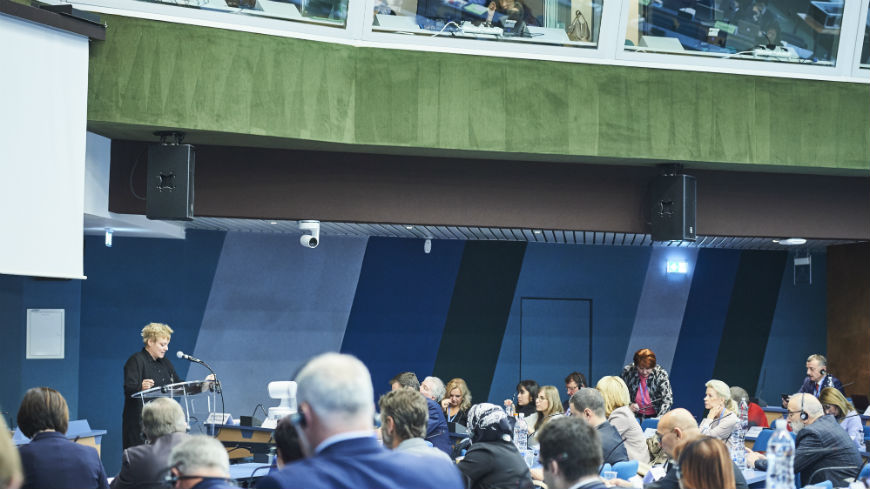Ten years after the adoption of the “Council of Europe Reference Framework for Regional Democracy”, many regional elected representatives have voiced concern about the tendency towards recentralisation that we are seeing in some European states: in a debate held on Wednesday 30 October 2019 in the Chamber of Regions, members of the Chamber talked about the future of this document, while at the same time emphasising the benefits of regionalisation for the future of European integration.
In the opinion of Nina Björby (Sweden), Vice-President for Democracy of the Assembly of European Regions (AER) and Chair of the Culture Committee for the Västerbotten region, the European Union should make use of the regions and grant them more power, especially now, at a time when European values are being called into question: “the regions are best placed to translate European ambitions into concrete action, as they are close to citizens and communities, giving them greater democratic legitimacy,” she added. In addition, regions are flexible when it comes to dealing with new challenges, not least in matters relating to climate and sustainable development, and this flexibility also helps strengthen co-operation between regions and the European Union. Commending the Council of Europe on the way in which it had effectively engaged with the regions, Ms Björby welcomed the closer links between the AER and the Congress.
Regional policies: promoting co-operation rather than competition
In the view of Martin Laffin (United Kingdom), professor of public policy and management at Queen Mary University of London, the concept of regionalism in Europe can now be observed from 6 perspectives, which have been profoundly changed by trade and economic globalisation. Following some initial success in catching up on the wealthier regions, poor or disadvantaged regions are once again falling behind, he explained. As he sees it, widening economic differences are leading to an “unequal regionalism” characterised by increasing hostility towards not only central governments but also wealthier areas.
In some countries, governments pursued a policy of “competitive regionalism” until the 1970s in an attempt to reduce regional differences, by creating incentives, for example, for firms to invest in poorer regions. At the same time, however, certain regions have become, through their dynamism, economic “motors” that drive the entire country, so much so that any restrictions on their growth might damage the wider economy. Today, each region must find its niche in a globalised environment, but not all of them have the powers and the resources to do so.
Referring to social policy, identity and cultural regionalism, that often fuel demand for greater autonomy, Martin Laffin ended by looking at “collaborative regionalism” under which regions work together on joint projects and which can provide a “way forward”, allowing regions to take the initiative in place of central governments. It is interesting to consider how collaborative regionalism can provide a substitute for competitive regionalism, particularly today when there is a pressing need to avoid exacerbating the gap between regions.
European regional elected representatives worried about recentralisation
The debate that followed these presentations highlighted the fears that many elected officials have about the dangers of recentralisation within European states. Vanessa Charbonneau (France, EPP/CCE) underlined the importance of the regions in terms of territorial cohesion and European development. While regions have gained more powers in some areas, she was disappointed to note that French regions have lost some of their powers, in the field of learning for example, and are facing budget cuts. Eirini Dourou (Greece, SOC) felt it was a pity that some states "do not recognise the role of the regional level in dealing with issues such as climate or refugees", which she considered to be among the main concerns exercising the minds of ordinary people.
With regard to European cohesion, Doerte Liebetruth (Germany, SOC) described an initiative by the regional parliament of Lower Saxony, which aims to enable all young people living in the Land to participate in an exchange with another European region at least once before the age of 25.
Finally, returning to the "reference framework for regional democracy", Peter Florianschuetz (Austria, SOC), expressed regret that it was not binding and considered that despite the wide differences between European regions, the Congress should undertake further efforts to make it a truly binding charter.
** 37th Session of the Congress **
File 37th Session - Agenda - Videos and photos – Mediabox interviews




